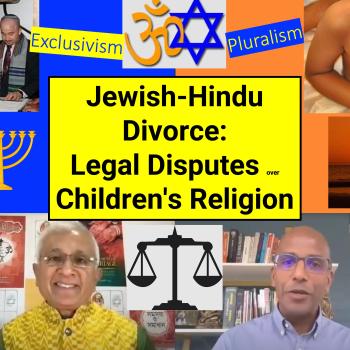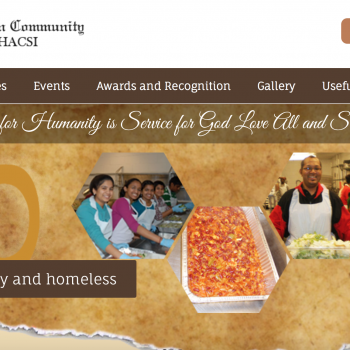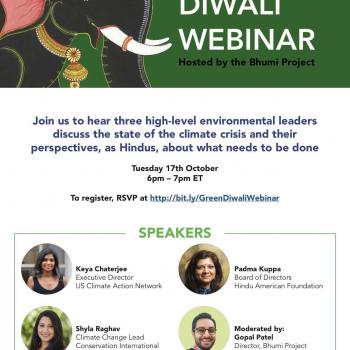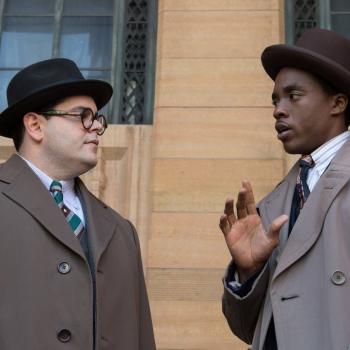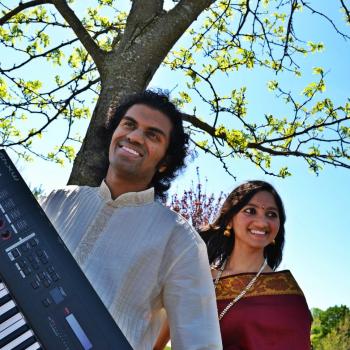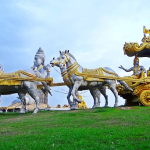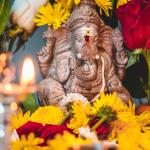To consider the question of whether faith prevents or propagates intolerance, I am stuck, as I often am when providing a Hindu perspective on a variety of things. When asked about Hinduism, deeply rooted in the Eastern philosophies of ancient India, it’s often difficult to provide a clear cut answer in English, a Western language with its origins in the tribal dialects spoken by the Angles, Saxons and Jutes. And then to respond to the auxiliary question, of whether someone has the right to deny the veracity and historicity of a particular faith tradition, adds additional layers of difference and complexity. Does faith mean religion, belief, trust, confidence, conviction, or something else? Doesn’t veracity and historicity of a faith tradition assume that we are operating within the framework of a prophetic tradition, where there is a starting point, and series of events following the arrival of a prophet, creating a historical context? What happens when your faith tradition doesn’t regard this as critical — or doesn’t have a singular starting point, or a single prophet whose words can be propagated — and can or can’t be denied. But considering these questions in the context of Denial, the movie based on the book Denying the Holocaust: The Growing Assault on Truth and Memory by Emory University professor Deborah Lipstadt, an acclaimed American writer and historian, I can definitely find ways to relate and respond as a Hindu. After all, The Truth is One, whatever names are given to it by the Wise (and also not so wise) — and whoever tries to deny it.
In 1993, while Lipstadt was publicizing her book, a well-known anti-Semite was in the audience, and throws accusations her way. She refuses to engage, and eventually he sues her for libel. In the UK, where this takes place, the laws around libel are complicated, and the burden is on the defendant to prove that the Holocaust actually happened. The lawyers who take up her case have a low-key strategy that doesn’t allow Lipstadt or Holocaust survivors to testify, thus limiting the anti-Semitism that the public must face, and end up putting the Holocaust on trial.
https://www.youtube.com/watch?v= https://www.youtube.com/watch?v=yH7ktvUWaYo
As a Hindu who’s heard personal narratives of what happened — what continues to happen — in Pakistan, Kashmir and Bangladesh since the partition of the Indian subcontinent, and as a Board member of a human rights organization that tries to bring to light the oppression and genocide of Hindus in South Asia and around the world, I can clearly relate to the challenge of denial. Just as accusations of anti-Semitism can push those who have a direct connection to the Holocaust into a state of frustration, so too can the denial of what has happened in Pakistan, Bangladesh and Kashmir leave me speechless. The burden of proof is also mine, and yet I must speak out. As Simon Wiesenthal said in The Sunflower: On the Possibilities and Limits of Forgiveness:
“The schools would fail through their silence, the Church through its forgiveness, and the home through the denial and silence of the parents. The new generation has to hear what the older generation refuses to tell it.”
And so even if I am confronted with ignorance and intolerance, I continue my work of advocacy: I have to tell my truth, and sustain the history of my Hindu brothers and sisters by re-telling their stories. In our current political climate, the intolerance of one group butts up against the intolerance of the other: people often take a single issue to the polls — such as abortion, gun control or healthcare – creating stark polarization. And Indo-US relations have also become a single issue for some: the decades of encouragement that the US has given Pakistan has resulted in more global terror — and had a significant impact on its nearest neighbor, India, home to roughly 90% of the world’s Hindu population and a secular democracy like the US. I also have to tell my truth in light of the current academic context, where the exoticizing and eroticizing of my faith tradition limits it from being understood on par with other world religions, distorting it to something I and fellow Hindus cannot recognize, where scholarly evidence of Hinduism’s history is denied.
So yes, faith, depending on how it is framed, can promote intolerance and deny historical veracity. But if pluralism is the foundation of one’s faith and the way one approaches all religious traditions, there is hope that no one will be denied, that understanding the Truth will lead to acceptance. But pluralism, as Prof. Diana Eck of Harvard’s Pluralism Project points out, is an energetic engagement with diversity; we must constantly keep seeking the Truth.



